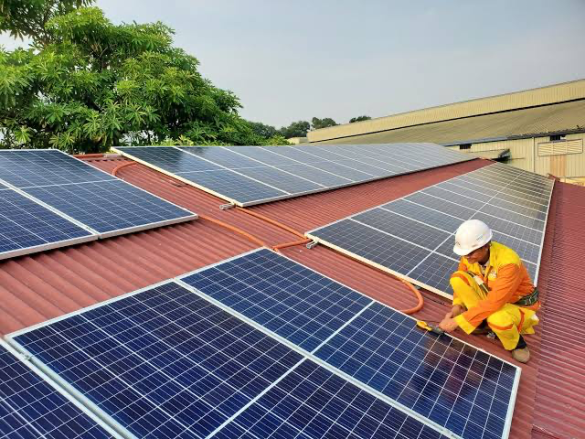Three hospitals in Ghana have been equipped with solar energy systems to ensure an uninterrupted electricity supply, marking a significant improvement in healthcare services. The installation of these solar systems aims to tackle the frequent power outages that have hindered medical facilities in the region.
The projects include a 61KWp system at Finney Hospital and Fertility Centre, a 21KWp system at Barnor Memorial Hospital, and a 30KWp system at Mother-Love Hospital. These installations were developed and implemented in partnership with Tradeworks Limited, a local solar energy company.
The ECOWAS Centre for Renewable Energy and Energy Efficiency (ECREEE), through the ECOWAS Special Intervention Fund (ESIF), provided technical support and co-funding for these projects. This collaboration has been instrumental in ensuring the success of the solar energy systems.
“These projects mark a significant step forward in enhancing the quality of healthcare services in the region,” said ECREEE. “By providing uninterrupted power supply through these solar systems, the project ensures that medical facilities can operate efficiently without the disruptions caused by power outages.”
The importance of a reliable power supply in hospitals cannot be overstated. Continuous electricity is essential for various critical functions, including operating medical equipment, preserving medicines, and ensuring the overall safety and comfort of patients.
In March, the Ghana Ministry of Health revealed that discussions were ongoing with the Electricity Company of Ghana (ECG) to resolve outstanding debts owed by 91 hospitals. These health institutions owe a total of GH¢261 million (around $16.8 million) to the power distribution company. Despite these debts, most of the owed amounts have not yet been recovered by ECG.
On July 16, the LEKMA Hospital experienced a power cut due to outstanding bills and had to rely on its backup generator, according to local media reports. Electricity was restored a few days later after a Member of Parliament intervened on behalf of the hospital. This incident highlighted the vulnerability of hospitals to power cuts due to unpaid bills.
Last year, Philip Agbezudor, the Public Utilities Regulations Commission (PURC) Regional Manager, stated that hospitals are not exempt from power and water disconnections. He cited Legislative Instrument (L.I) 2413, section 37, which mandates that any customer owing ECG or the Ghana Water Company Limited (GWCL) must settle their arrears within 14 days.
However, Agbezudor noted that there is special protection for hospitals due to their role as essential service providers. After the 14-day period, utility companies are required by law to draw up a payment plan with their clients and offer an additional 21 days for payment before any disconnection can occur. Despite these regulations, ECG had allowed facilities, including hospitals, to accrue debts for more than two years.
The implementation of solar energy systems in Ghanaian hospitals is part of a broader effort to improve healthcare services across Africa. The African Union High-Level Panel on Emerging Technologies (APET) believes that Mobile Health Clinics (MHCs) powered by solar energy can potentially reduce healthcare disparities for Africa’s most vulnerable populations.
“By providing adequate, reliable, renewable electricity, mobile health facilities can operate over extended hours. This can allow medical practitioners to consult with more patients daily and offer emergency medical services around the clock,” said APET. Solar energy systems enable healthcare workers to deliver care and diagnoses, charge cellphones for communication, and safeguard vaccines and other medications in portable cooler units.



